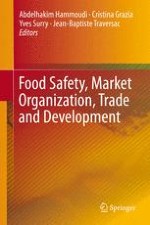2015 | OriginalPaper | Buchkapitel
8. Food Safety Standards and International Trade: The Impact on Developing Countries’ Export Performance
verfasst von : Honda Keiichiro, Tsunehiro Otsuki, John S. Wilson
Erschienen in: Food Safety, Market Organization, Trade and Development
Aktivieren Sie unsere intelligente Suche, um passende Fachinhalte oder Patente zu finden.
Wählen Sie Textabschnitte aus um mit Künstlicher Intelligenz passenden Patente zu finden. powered by
Markieren Sie Textabschnitte, um KI-gestützt weitere passende Inhalte zu finden. powered by
